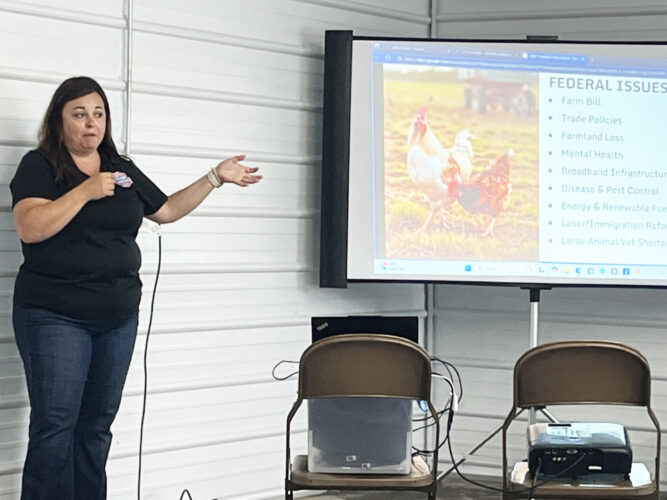Farm bureau discusses concerns with local officials and agencies

Staff photo / Bob Coupland
Mandy Orahood, organization director for the Trumbull County Farm Bureau, discusses issues of concern to farmers and those in agriculture at a meeting Thursday at Bortnick Tractor in Johnston. Input gathered at the event are used to develop policy resolutions, which are voted on by members at the county’s annual meeting.
The policy discussion was held at Bortnick Tractor, where participants had the opportunity to provide input on agricultural and rural issues that will help shape the organization’s grassroots policy development process.
More than 20 people attended including county and state officials, and representatives of local agencies and organizations.
“The policies of the farm bureau are the backbone of our work. They guide our advocacy efforts, inform our programming and, ultimately, reflect the priorities and concerns of our members,” said Mandy Orahood, organization director for the farm bureau.
She said the input gathered at events like these are used to develop policy resolutions, which are voted on by members at the county’s annual meeting.
Orahood said approved policies move on to the Ohio Farm Bureau and, in some cases, to the national level through the American Farm Bureau Federation.
Steve Kacerski, county public policy team leader for the farm bureau, said the issues discussed are important to farmers and those in agriculture.
Orahood said those who attended became more aware of the issues affecting farmers.
“We hope they take the information with them and help find solutions. We have issues from farmland to mental health of farmers that are of concern,” she said.
TOP PRIORITIES
Orahood said 2025 priorities of the Ohio Farm Bureau’s agriculture and rural communities action plan are: promoting a strong business climate, creating a responsible regulatory environment, promoting an efficient state budget, preserving Ohio’s farm heritage, building healthy rural communities, and engaging in and increasing grassroots advocacy.
“As a farm bureau, we are always advocating for agriculture and policies at the state level and national level and also identifying and addressing member issues. We will continue to be the voice for agriculture,” Orahood said.
She said an issue farm bureau has focused on is zoning, more so in Ashtabula and Geauga counties.
Orahood said a main concern is loss of farmland, noting that 300,000 acres in Ohio has been lost in the past five years.
Gary Smallsreed of Braceville and the farm bureau, said preserving more land for agricultural use is challenging with funds not always available to do so. He’s been trying since 1990, when he began serving on the Northeast Ohio Farmland Preservation Committee.
“The loss of farmland has been on our radar for 35 years. Even with our best efforts, this is a concern today,” Smallsreed said.
Orahood said there is also concern for farmers’ mental health and others in agriculture.
Statistics show higher rates of suicide among that group compared to the general population.
She said stress and access to health care are concerns when it comes to the health and well-being of the agricultural community.
Kacerski, who has served on the state public policy committee, said, statewide, the farm bureau is concerned about a variety of “hot button issues.”
He noted one such issue is that of feral hogs, a problem that has affected parts of the state, mostly southeastern Ohio
He said there are concerns of the diseases the hogs can carry and their effects on the normal hog industry in Ohio.
Fortunately, Kacerski said, there has not been a feral hog issue in northeastern Ohio.
PEST CONCERNS
Lee Beers, Ohio State University extension educator for agriculture and natural resources for Trumbull County, said pest issues include worms found in some cattle and the long-horn tick, with efforts to address funding for research, treatment and prevention.
“Ohio has one of the highest tick populations in the country. With that comes health concerns,” Beers said.
Orahood said there is also a concern of the shortage of veterinarians for larger animals and livestock. She said Trumbull County is fortunate to have them but other parts of the state and nation see a shortage.
She added that mental health concerns are also there for veterinarians.
FUNDING CONCERNS
The issue of property tax reform and funding drew attention as rural communities do not have the same tax base as urban areas.
Trumbull Auditor Martha Yoder said the loss of property taxes would be devastating to rural areas.
“The townships only have property tax and rely on that property tax,” said Yoder.
Orahood said farmers have the concern of emergency preparedness for disaster and bad accidents and are working with emergency management agencies.
“We need to know what resources are out there when we have emergencies. There is bin safety training and livestock safety training, which are important,” Orahood said, noting that many farm bureau members are also volunteer firefighters who respond to fires and other emergencies.
Comments and input can also be submitted to trumbull@ofbf.org or mail them to Trumbull County Farm Bureau, 8460 Ridge Road. North Royalton, OH 44133.
